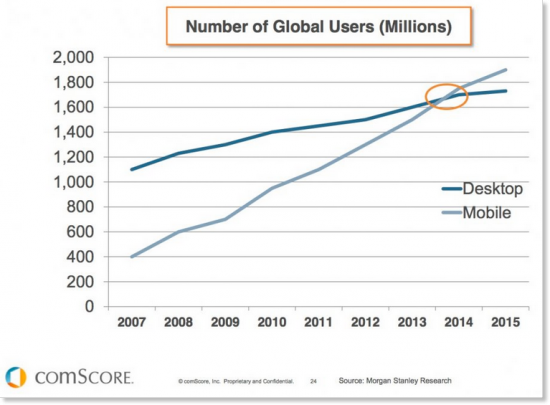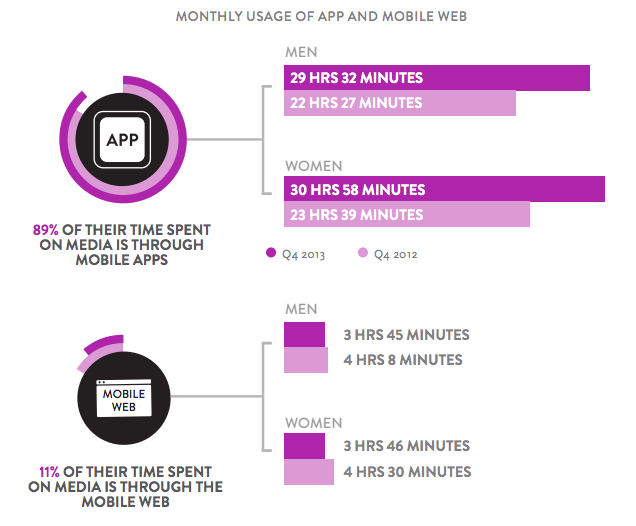Mobile is fast becoming the go to place for media consumption and business models are having to shift in order to accommodate the ever-growing population of mobile centric consumers.
With Google set to expand on its mobile-friendliness ranking signal during the coming days, the importance of mobile will be more profound than ever and businesses need to invest in the online experience of their consumers. If they do not offer a mobile-friendly site, many businesses are likely to see a significant drop in rankings.
“For many years we have talked about the ‘tipping point’ where mobile web usage exceeds desktop usage. Research shows that we’re now past this point with many retailers like ASOS and John Lewis getting more than 50% of their site visits from mobiles, so businesses should treat mobile very seriously indeed. A mobile strategy should cover the full customer lifecycle and digital channels from search to social to email as well as mobile optimised sites and apps” – Dave Chaffey, CEO at Smart Insights.
To highlight the importance of this challenge, we’ve pulled together some of the latest statistics:
- Mobile’s share of global web traffic leapt 39% since last year, with one-third of all web pages now served to mobile phones!
- 1.65 Billion active mobile social accounts in January 2015
- Mobile drives over 50% of all ecommerce traffic
- By 2018 video will account for over 2/3 of mobile usage
- Smartphones have become so important to consumers that 23% would rather give up TV than their smartphone.
- 87% of smartphone users have looked for local information. 76% have taken action as a result.
- 41% look for local information at least once a week
- 13% look for local information daily
- 73% have researched a product or service on their phone
Search is the most common starting point for mobile research
- 47% Start on search engines
- 33% Start on branded websites
- 26% Start on branded apps
1h52m – Average daily use of the Internet via a mobile phone
- 69% of UK smartphone owners use apps daily.
- 29 – the number of apps on the average smartphone.
- 10 – the number of apps actively used in the last 30 days.
- Mobile and tablets now account for 38% of all web pages served around the world.
- Mobile ad spend is due to increase by 60% this year and will reach a ‘tipping point’ in 2016 when mobile ad spend exceeds spend on desktop ad formats.
- Research that starts on smartphones leads to purchase across channels
- 40% research on smartphone then purchased via computer
- 28% research on smartphone then purchased offline
Riding alongside the mobile revolution is another huge boom in the form of app installs. In fact, people are now using apps far more than mobile browsing.
There are a number of factors driving the increased usage of apps. Firstly, the increasing number of consumers adopting mobile devices is increasing daily. Screen sizes are also notably bigger than a few years ago, making content consumption and shopping much easier. There is also now technology available to make apps more engaging such as one-touch checkout via Apple Pay. More importantly, however, is the increased availability of 4G making mobile and app browsing all possible.
In 2012, 26% of smartphones worldwide connected to the web via 2G, 60% via 3G and 14% via 4G. Fast-forward 3 years, 12% of smartphones connected via 2G, 41% via 3G and 47% via 4G.
The benefits of owning an app
Brands that don’t have an app that encapsulates what’s good and worthy about their company are evidently missing a huge trick. Apps are no longer just for big name brands, more and more small and medium sized businesses are starting to understand that an effective mobile strategy involves more than just a mobile-friendly website.
There are a number of advantages to having an app of your own:
- Business loyalty
- Brand reinforcement
- Increased visibility
- Increased exposure
- The ability to connect with customers on the go
- Increased sell-through
However, when you get caught up in the excitement of it all it’s often easy to forget what it is you’re actually trying to achieve. In other worlds what are the business goals? Installing an app is not a typical marketing end – a marketing end is getting someone to engage with your product or service.
Brands looking to launch a mobile app need to think about how it can impact downstream goals such as in app purchases or a purchase in store. They need to ensure they remarket to these consumers and remind them of the value proposition.
The fact that they have downloaded the app is only the start of the conversation with the customer, and not necessarily the end goal. If you are looking to create an app, this is a useful guide that offers 8 tips from Apple.
Mobile sites are extremely important, however they do not replace the need or benefits of branded Mobile Apps. When it comes to the question of ROI, it’s easy to see the authority a mobile app can offer. To put this into a bit of perspective, think about the power you will have as more and more customers download and start using your branded app. You can reach these customers directly through the use of push notifications without the huge costs and efforts required through traditional methods such as mail outs. Mobile Apps are the most affordable and effective way to reach out to consumers and will help you to connect, inform, build loyalty as well as generate new and repeat business.
So, what does it all mean?
Well for one thing, mobile marketing is no longer a nice to have, it is now a must have for any business wanting to succeed. Digital content consumption has changed and brands need to ensure that their message is positioned where and how it needs to be in order to reach their target audience.
“The question we should be asking is no longer ‘Do we need a mobile strategy?’. At this point, mobile devices are simply another way in which people use the web. For instance, social media users are overwhelmingly using these platforms predominately on mobile devices; more and more people use their phones to check and send email; second-screening and multiscreen customer journeys are commonplace and with the advent of technologies like 4G, high-speed internet on the go is very much a reality. Our focus now needs to be on delivering a consistent, technically sound user experience across as wide a range of devices, browsers and OS as possible.” – Bridget Randolph – Consultant, Distilled.
The increasing power of mobile devices and increased availability of wireless Internet means that consumers are now able to comfortably consume a larger breadth of digital content in the “lean back” mode.
What this means is that with mobile acting as a second screen consumers are becoming quite comfortable using their handheld device to switch from “lean back” to “lean forward” mode (Traditionally computers were always associated with the “lean forward” more). This is why it’s evermore important that brands create engaging content suitable for all different types of consumer journeys. Along with this, brands need to ensure the content can fit the screen being used at that moment in time, suitable for either “lean back” or “lean forward” mode as consumers could switch at any point. In other words, your content should evolve along with the behaviour of your consumers’.
“How you communicate over mobile should be approached differently to how you communicate over the desktop. Factors such as the tribes you are reaching out to also should have an effect on the content you produce for this platform.
Right now the space is quickly evolving and so the opportunity to be at the front of the crowd is quite big. My advice is to try a number of things, test, test, test and then assess how to form your strategy.” – Lyndon Antcliff, Author of Create Magnetic Headlines
Mobile should be central to any modern marketing strategy and its value is only going to increase in the future. Make sure your business isn’t missing out
Need help with your mobile strategy? Get in touch today.


